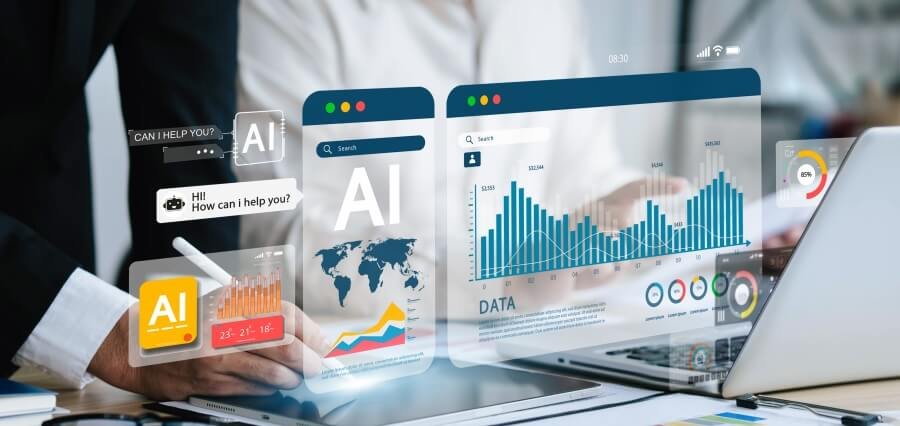#AI Era
Technological developments in several fields have revolutionized the human lives. One of the several technological applications is Artificial intelligence or AI. It is transforming the way businesses operate across the globe, offering unprecedented opportunities for innovation, efficiency, and growth. From automating routine tasks to providing deep insights through data analysis, AI is reshaping industries and transforming the traditional business landscape. As companies increasingly recognize the potential of AI, its adoption has become a key driver of competitive advantage in various sectors, enabling businesses to optimize operations, enhance customer experiences, and explore new business models. The role of AI in business is multifaceted, impacting areas such as marketing, finance, human resources, and supply chain management, among others.
In the realm of marketing, AI is playing a crucial role in personalizing customer experiences and improving engagement. Businesses are leveraging AI-powered tools to analyze vast amounts of data, enabling them to understand customer preferences and behaviours with greater precision. This allows for the creation of highly targeted marketing campaigns that resonate with individual consumers. AI-driven algorithms can predict customer needs, recommend products, and even automate the delivery of personalized content, resulting in higher conversion rates and improved customer loyalty. For example, e-commerce giants like Amazon use AI to suggest products based on a customer’s browsing history and previous purchases, enhancing the shopping experience and driving sales.
AI is also transforming the finance industry by enabling more accurate and efficient processes. In areas such as risk management, AI algorithms can analyze large datasets to identify potential risks and detect fraudulent activities. This is particularly valuable in industries like banking and insurance, where risk assessment and fraud detection are critical. Moreover, AI-powered financial analysis tools can provide real-time insights into market trends, helping businesses make informed investment decisions. Automated trading systems, driven by AI, are capable of executing trades at speeds and accuracies far beyond human capabilities, optimizing returns while minimizing risks. Additionally, AI is being used to streamline customer service in finance, with chatbots and virtual assistants handling routine inquiries, freeing up human agents to focus on more complex tasks.
Human Resources (HR) departments are increasingly adopting AI to improve recruitment, employee management, and performance evaluation processes. AI-powered recruitment tools can sift through thousands of resumes, identifying the most qualified candidates based on specific criteria. This not only speeds up the hiring process but also reduces biases by focusing on skills and experience rather than subjective factors. AI is also being used to enhance employee engagement and retention by analyzing data related to job satisfaction, productivity, and career development. By identifying trends and potential issues early, HR professionals can proactively address concerns, creating a more supportive work environment. Furthermore, AI-driven performance evaluation systems provide objective assessments of employee performance, helping to identify areas for improvement and opportunities for professional growth.
Supply chain management is another area where AI is making a significant impact. AI-powered analytics tools can predict demand with greater accuracy, enabling businesses to optimize inventory levels and reduce waste. This is particularly important in industries like retail and manufacturing, where inventory management is critical to maintaining profitability. AI is also being used to enhance logistics and transportation, with algorithms optimizing delivery routes and schedules to reduce costs and improve efficiency. In addition, AI can help businesses respond to supply chain disruptions more effectively by analyzing data in real-time and suggesting alternative strategies. For instance, during the COVID-19 pandemic, many companies used AI to navigate supply chain challenges, ensuring the continuity of operations despite global disruptions.
Customer service is another domain where AI is playing an increasingly important role. AI-powered chatbots and virtual assistants are becoming commonplace in customer service departments, handling a wide range of inquiries and providing instant support to customers. These AI systems can operate 24/7, offering a level of service that would be difficult to achieve with human agents alone. By automating routine tasks, businesses can reduce response times and improve customer satisfaction. Additionally, AI-driven customer service platforms can analyze interactions to identify common issues and areas for improvement, helping businesses to refine their service offerings and enhance the overall customer experience.
In the manufacturing sector, AI is driving the development of smart factories, where machines and systems are interconnected and can operate autonomously. AI-powered robotics and automation systems are being used to perform complex tasks with high precision, increasing production efficiency and reducing costs. Predictive maintenance, another application of AI in manufacturing, uses data from sensors and machines to predict when equipment is likely to fail, allowing for timely maintenance and reducing downtime. This not only extends the lifespan of machinery but also ensures continuous production and minimizes disruptions.
Moreover, AI is enabling businesses to explore new business models and revenue streams. In industries such as healthcare, AI is being used to develop innovative products and services, from AI-driven diagnostics to personalized medicine. By harnessing the power of AI, businesses can stay ahead of the competition and tap into new markets. For example, AI-powered health monitoring devices and applications are transforming patient care, offering personalized insights and improving health outcomes.
The application of AI in business is both transformative and expansive, impacting nearly every aspect of operations. From enhancing customer experiences and optimizing supply chains to driving innovation and creating new business opportunities, AI is becoming an indispensable tool for businesses seeking to thrive in an increasingly competitive and complex global market. As AI technology continues to evolve, its role in business will only grow, offering even greater potential for efficiency, innovation, and growth. Businesses that embrace AI and integrate it into their operations are likely to be the ones that lead the way in the future of industry.






Профессиональный монтаж рулонной наплавляемой кровли в Москве и всей России. Работаем с материалами: техноэласт, стеклоизол, битумная мастика. Гарантия до 10 лет. Бесплатный выезд и расчёт. Цена за 1м2 — от 350 рублей. Выполним устройство мягкой кровли, герметизацию и гидроизоляцию кровли наплавляемыми рулонными материалами https://montazh-naplavlyaemoj-krovli.ru/
Adventure Island Rohini is a popular amusement park in New Delhi, offering exciting rides, water attractions, and entertainment for all ages: attractions at Adventure Island
Neil Island is a small, peaceful island in the Andaman and Nicobar Islands, India. It’s known for its beautiful beaches, clear blue water, and relaxed atmosphere: how to reach Neil Island
https://pena-montazhnaya.ru/
על שתי הברכיים! אירינה הורתה לי. הדודות צפו בסצנה הזאת, שישבו על ספסל ליד הכניסה הסמוכה. יופי. צריך לסדר את זה איכשהו… – מותק, רק שיהיה לי תנאי אחד, כלומר הצעה … – מה המצב? על מה נערת ליווי בדרום תל אביב
Наш агрегатор – beautyplaces.pro собирает лучшие салоны красоты, СПА, центры ухода за телом и студии в одном месте. Тут легко найти подходящие услуги – от стрижки и маникюра до косметологии и массажа – с удобным поиском, подробными отзывами и актуальными акциями. Забронируйте визит за пару кликов https://beautyplaces.pro/okrug/czentralnyj-okrug/
מחזיקים חזק בהגנה, ובכל זאת לאט לאט נכנע: ראשית הוא מכניס את הראש פנימה, קצת מזג אוויר מתחיל כמעט צרחתי. הלשון שלו הייתה חמה, לחה, הוא ליקק אותי כאילו הוא רוצה לשתות את הכל. נאחזתי סקס אדיר דירות דיסקרטיות